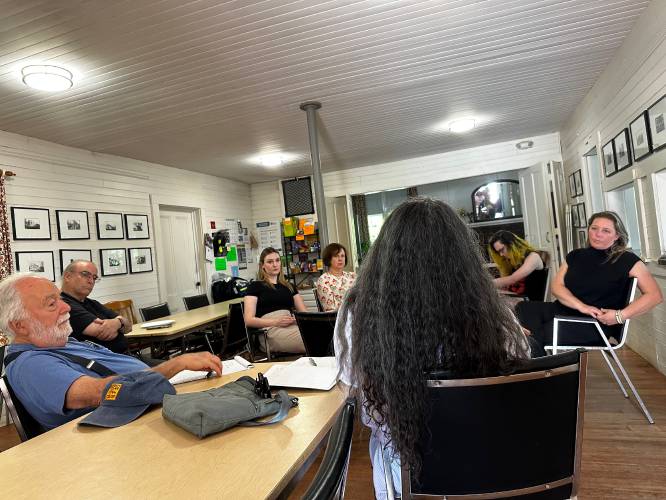Blais: Leverett to get public transportation this summer

State Rep. Natalie Blais held a town hall in Leverett on Friday to speak with residents about transportation and infrastructure projects and funding. CONTRIBUTED PHOTO/LIESEL NYGARD
| Published: 06-03-2024 12:14 PM |
LEVERETT — State Rep. Natalie Blais held a town hall in Leverett Friday to provide updates to residents on transportation and infrastructure projects.
Speaking to a small group, Blais announced that Leverett would be connected to public transportation, with a July, or August starting date.
“[It’s] right around the corner,” Blais said to the residents.
Blais shared the news after it was announced by the Healey-Driscoll administration that the Franklin Regional Transit Authority (FRTA) and Pioneer Valley Transit Authority (PVTA) are to receive a portion of $37 million being awarded through competitive grant programs.
The PVTA, through the Community Transportation Grant Program, is poised to receive $188,008 to help acquire 29 accessible vehicles, 25 of which will provide general coverage in the PVTA service area of Hampshire and Hampden counties.
The remaining four vehicles will be awarded to councils on aging. The Easthampton and Amherst councils on aging will each receive one accessible vehicle, while the Tri-Town Trolley service, which runs in East Longmeadow, Longmeadow and Hampden will receive two accessible vans.
The goal of these vehicle purchases is to “facilitate and support transportation for older adults, people with disabilities, and low-income individuals in the region,” according to Brandy Pelletier, PVTA’s manager of marketing, advertising and public relations and clerk to its advisory board.
PVTA intends to use some of these vehicles to launch a new “Connecting Rural Communities” service, which is “designed to increase accessibility within the rural communities of Greenfield, Leverett, Sunderland and Amherst,” according to authority. The service will be provided cooperatively with PVTA’s grant partners: South County Senior Center, Amherst Council on Aging and PVTA’s ADA paratransit provider MV Transit.
Article continues after...
Yesterday's Most Read Articles
Blais also informed residents that the House recently brought the regional transit authority funding “up to a historic high of $184 million.”
“That was really, really incredible,” Blais said. “And was in large part due to the advocacy of the caucus that that we have in the Legislature.”
Blais said it was the regional transit authority caucus that’s “really been pushing hard” alongside the Massachusetts Association of Public Health and Transportation for Massachusetts.
“They have been building this incredible statewide coalition based on arguing that transportation is so important to public health in order to get to your doctor’s appointment … your job and able to get child care,” Blais explained. “It’s really dependent upon a strong, reliable, safe public transportation system.”
Blais also talked briefly about rural roads adding that the local legislative delegation has been working “really hard to send more money to rural communities for roadway maintenance.” In their fiscal year 2024 budget, Blais said they were able to get $25 million, which included just over $110,00 for Leverett to work on its local roadways. In a budget just passed, Blais said they included an additional $25 million for supplemental local road and bridge funding.
In the transportation bond bill that Gov. Maura Healey recently signed, Blais noted that an additional $25 million would be distributed based on roadway mileage.
One of the final topics of conversation was railroads. The discussion was based on a recently completed feasibility study, which found that the northern tier rail would be Boston to North Adams, with stops. The highest ridership would have stops in Fitchburg and Greenfield. Seasonally, stops could occur in Shelburne Falls and Charlemont, then the passenger rail to Fitchburg could make stops from Fitchburg to Gardner and then Gardner to Orange and lastly, Orange to Greenfield.
“We’re able to do this alongside the communities and we’re trying to build a network of communities,” Blais said. “From North Adams all the way to Boston. Here it can be a real economic driver for some of these communities that I’ve seen populations decline.”
The group then dived into the subject of unpaved dirt and gravel roads, which Blais said represents a large portion of roadway mileage in rural communities.
“We’re talking about supporting our communities in terms of transportation dollars, we really need to be looking at spending some more money on these dirt and gravel roads because so many of them [are] falling apart,” said Blais, explaining that the root cause is because of peat. “With more frequent freeze-thaw cycles, and more intense storm events we are seeing more unpaved roads fail and shut down. I’ve offered to support the town in whatever we can to find some funding.”






 ‘It’s a Wonderful Night in Turners Falls’ showcases village businesses, nonprofits
‘It’s a Wonderful Night in Turners Falls’ showcases village businesses, nonprofits Sackrey Construction Co. of Sunderland celebrating 35 years in business
Sackrey Construction Co. of Sunderland celebrating 35 years in business Photo: As darkness falls
Photo: As darkness falls Leverett residents rap Kittredge compound plans, urge caution as negotiations for 400 homes move forward
Leverett residents rap Kittredge compound plans, urge caution as negotiations for 400 homes move forward 
